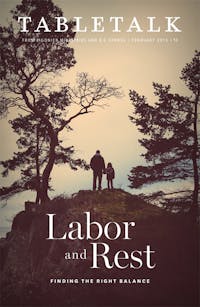
Request your free, three-month trial to Tabletalk magazine. You’ll receive the print issue monthly and gain immediate digital access to decades of archives. This trial is risk-free. No credit card required.
Try Tabletalk NowAlready receive Tabletalk magazine every month?
Verify your email address to gain unlimited access.
Back before electronic calendars and smartphones, many of us used something called a Day-Timer. I got my first professional Day-Timer when I joined the staff of a church at nineteen years old. And though I haven’t used a Day-Timer in more than a decade, I recently came across an old one, and when I opened it I was immediately drawn to the words that I wrote on the front page of my calendar: “The busy man is a lazy man.” From my first Day-Timer to my last, I wrote those words on the front page so that every time I opened it, I would be reminded not ever to become an overscheduled workaholic, running around like a chicken with his head cut off, too busy and too rushed to do anything well. Borrowing from something C.S. Lewis wrote, it’s the lazy man who does not properly schedule his time, who cannot say no, who does not plan ahead properly, who is often late for appointments, who is always rushing around, not calling people back in an appropriate time frame, and so on.
I have worked hard over the years never to let myself become busy. Still, most people who know my schedule would likely call me busy. For example, my next available scheduled lunch appointment is three months away, most of my phone calls are scheduled weeks out, and most major calendar items are typically scheduled more than a year or two out. Nevertheless, I am by no means busy; my schedule is simply full. My dedicated assistants work hard to meticulously maintain my schedule so that I have ample time to attend to urgent pastoral matters within the church, such as responding to a family in crisis, visiting a dying church member in the hospital, or counseling someone facing a major predicament. Furthermore, such scheduling allows me to care properly for my wife and children, spending all the time with them I possibly can so that we can be together, play together, and rest together. For what does it profit a pastor if he gains the whole church but loses his family?
Both labor and rest are creation ordinances given to us by God before the fall. They are given to us for our good and for God’s glory, and God calls us to work hard so that we can rest hard. By God’s design, the most revolutionary thing we could do in our busy, fast-paced society is take one day every week to rest and worship with our family and friends. However, we are living in a generation that doesn’t rest well because it doesn’t know what it really means to work hard, plan well, and say no to various opportunities and activities. And too often, the culprit is the local church that programs its people with so many activities that people have no time left to spend with their families and friends to enjoy life together and rest together—let alone take care of widows and orphans.
In many cases, our inability to rest says more about the busyness of our hearts than the busyness of our schedules. As Christians, we are called to labor well and rest well, and only when we do both as God has directed us will we find the right balance in life.
